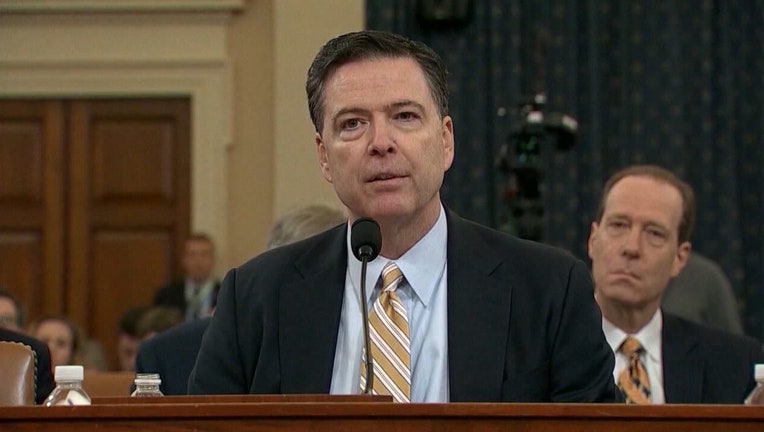James Comey violated FBI policies with memos on Trump discussions, IG report says

FOX NEWS - A scathing inspector general report released Thursday said that fired FBI Director James Comey violated bureau policies by drafting, leaking and retaining memos documenting discussions with President Trump.
The Justice Department's official watchdog concluded that the memos Comey kept were in fact "official FBI records."
The office said he "violated applicable policies and his FBI Employment Agreement by providing one of the unclassified memos that contained official FBI information, including sensitive investigative information, to his friend with instructions for the friend to share the contents of the memo with a reporter."
Further, the IG determined that Comey kept copies of four memos (out of the total seven he drafted) in a personal safe at home after his removal as director -- and in doing so also "violated FBI policies and his FBI Employment Agreement by failing to notify the FBI that he had retained them, or to seek authorization to retain them." And the IG said Comey again violated the rules "by providing copies ... of the four memos he had kept in his home to his three private attorneys without FBI authorization."
While the findings of the probe were forwarded to the DOJ, the department has declined prosecution. But for Comey, who has cultivated the image of a by-the-book and irreproachable leader since his termination in 2017, the review shined a harsh light on his decisionmaking in the final, beleaguered weeks of his tenure at the head of the nation's top law enforcement agency.
In a pointed passage, the report faulted Comey for disclosing sensitive information.
"[E]ven when these employees believe that their most strongly-held personal convictions might be served by an unauthorized disclosure, the FBI depends on them not to disclose sensitive information. Former Director Comey failed to live up to this responsibility," the report said. "By not safeguarding sensitive information obtained during the course of his FBI employment, and by using it to create public pressure for official action, Comey set a dangerous example for the over 35,000 current FBI employees—and the many thousands more former FBI employees—who similarly have access to or knowledge of non-public information."
The inspector general's separate, broader review of potential intelligence community surveillance abuses remains ongoing. Earlier this month, it emerged that IG Michael Horowitz had referred Comey's case to the DOJ for a possible criminal prosecution, but that lawyers opted against bringing charges -- with one source telling Fox News it "wasn't a close call."
Comey admitted to Congress in June 2017 that, after he was fired, he purposefully leaked several memos through an intermediary to ensure that a special counsel would be appointed. The media firestorm that followed the leak proved a watershed moment that led to Special Counsel Robert Mueller's appointment.
Public outrage centered on the news that Comey wrote in one of his memos that Trump had told him, "I hope you can let this go," amid reports that former National Security Adviser Michael Flynn had lied to the FBI and senior White House officials about his contacts with Russia's government.
Flynn later pleaded guilty to one count of lying to FBI agents in the White House.
Although Comey said he wrote the memos so that they would not contain classified information, two of Comey's memos were later determined by the FBI to contain information classified at the "sensitive" level.
And Comey's memos included a slew of other secretive information, including the "code name and true identity" of a confidential source, according to a court-ordered filing by the Justice Department earlier this year.
Comey meticulously outlined "foreign intelligence information obtained from and through" the key human source, "information about whether the FBI initiated coverage through the Foreign Intelligence Surveillance Act (FISA) on a particular individual," relevant "sources and methods" used in the FBI's investigation, as well as "information concerning the President's foreign policy decisionmaking," according to the DOJ.
All of that information is "currently and properly classified," the DOJ said.
Horowitz first publicly confirmed last year that his office was investigating Comey for his handling of classified information related to the memos.
“I didn’t consider it part of an FBI file,” Comey told Fox News' Bret Baier last year, referring to the memos. “It was my personal aide-memoire…I always thought of it as mine.”
Comey added that he expected Horowitz to issue a report about the memos, "not on the handling of classified information, because that's frivolous, but on: Did I comply with policy? Did I comply with my employment agreement?"

